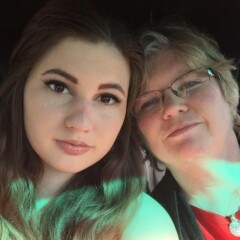Brenda is a dedicated mother and hardworking professional that experienced a deep vein thrombosis (DVT or a blood clot in the leg) after surgery. She attends NATF’s in-person blood clot support group in Boston, MA. Brenda’s story highlights the importance of knowing your family history and how it can interact with additional risk factors.
When did you first have a blood clot?
I had it following surgery. I had had a double mastectomy and was undergoing reconstruction.
Probably within three days after surgery, I could feel a pain in my leg. I thought nothing of it. I kept doing my thing and basically, I thought it was a charley horse. On the third day of it not getting any better, I decided to call my primary care doctor.
He ordered an ultrasound. I was kind of surprised when the tech told me that I had a blood clot.
Did you know what a blood clot was before you experienced one?
I knew what it was because my dad has had blood clots for years. His always went to his lungs.
It’s in the family, so I was aware of it. I just wasn’t aware that I would actually get one, because I had had so many surgeries prior to that one. For me, this surgery was so simple. All of the other ones I’d had were long and major. That’s when I would have expected to have one.
Were the doctors able to explain why this surgery triggered a blood clot?
It was explained to me that the type of surgery I had involves a lot of inflammation. It’s not uncommon, even though it was such a small surgery. The inflammation that it brings on can actually put you at a greater risk for a blood clot.
How did you feel after your diagnosis? Were you concerned?
I was kind of concerned. I was concerned because when my dad had blood clots, they had travelled to his lungs. So, whenever I felt anything strange I would think, “Man, did this go to my lungs?”
But, I had a lot of faith in my primary care doctor. When I went back to see him a couple of weeks after my diagnosis, we had some good conversations and my leg was feeling great. I felt like I was wasting his time. During my visits to him, I was able to ask my questions without feeling rushed. That was pretty comforting.
I figured I was pretty safe at that point.
Has your blood clot impacted your life at all since your diagnosis?
It’s always kind of in the back of my mind, wondering if it’s ever going to happen again.
Brenda had a scare in January of 2018 when she broke her foot.
When I broke my foot, that was a concern. I had been in the emergency room (ER) in January for pneumonia and a collapsed lung. Then, I broke my foot. My other leg developed a pain similar to when I’d had my blood clot. I remember thinking, “What are the odds this would happen again?”
I went to the ER thinking I had another blood clot, but then I was told it was negative. It turned out to be fine.
Do you have any advice for other blood clot patients?
I was very fortunate with my experience because I had such great medical care. I really think that if you have caring, intelligent doctors that make you part of the team, instead of just seeing you as a patient, you’re fortunate. It’s important to ask questions.
I think it’s also important to have a good support system. There are other people out there that have had similar experiences, and people don’t always know that. I think the NATF in-person support group is a wonderful thing, and it has helped quite a bit. It’s nice to hear from different people.
Thank you, Brenda, for sharing your story!
